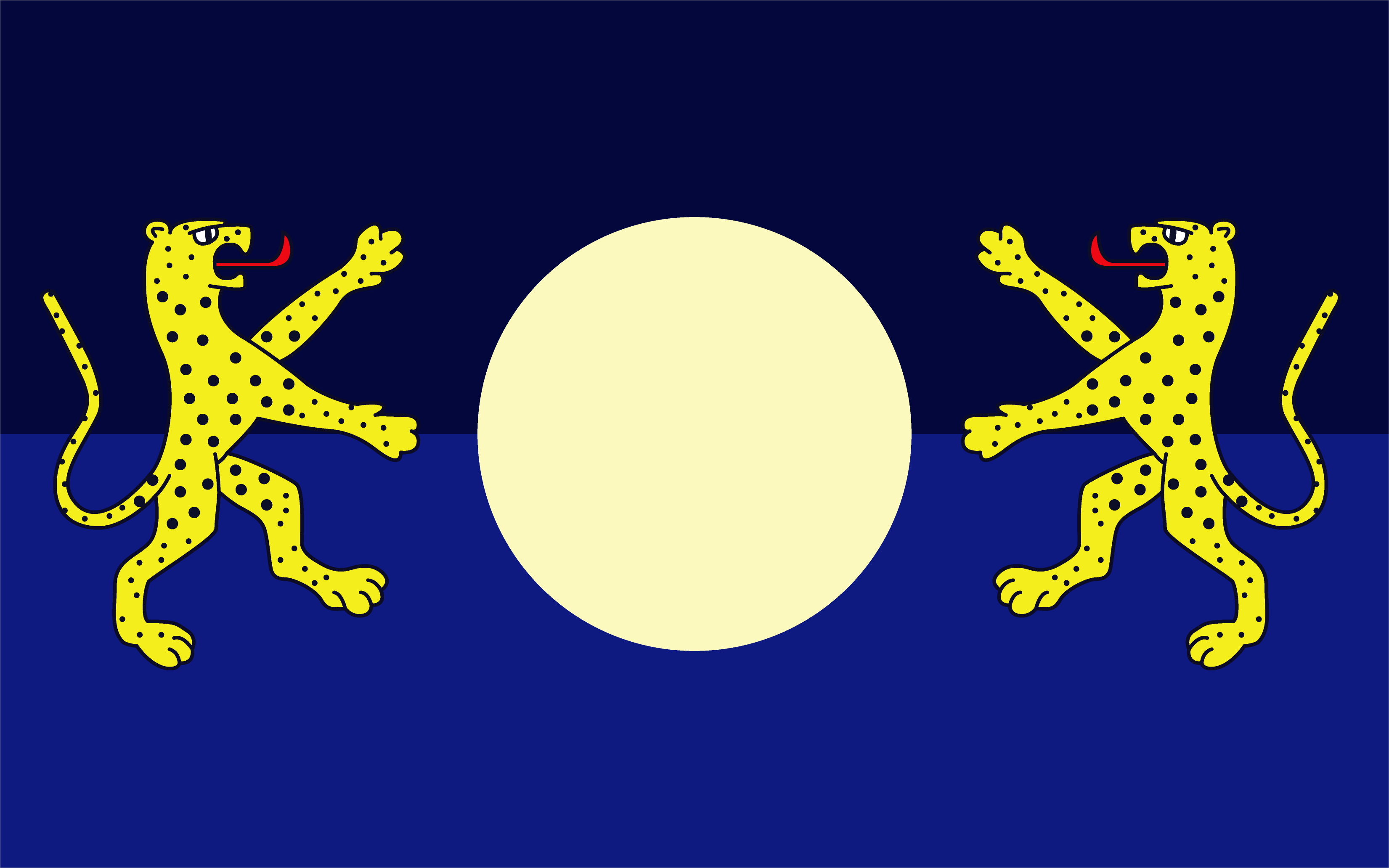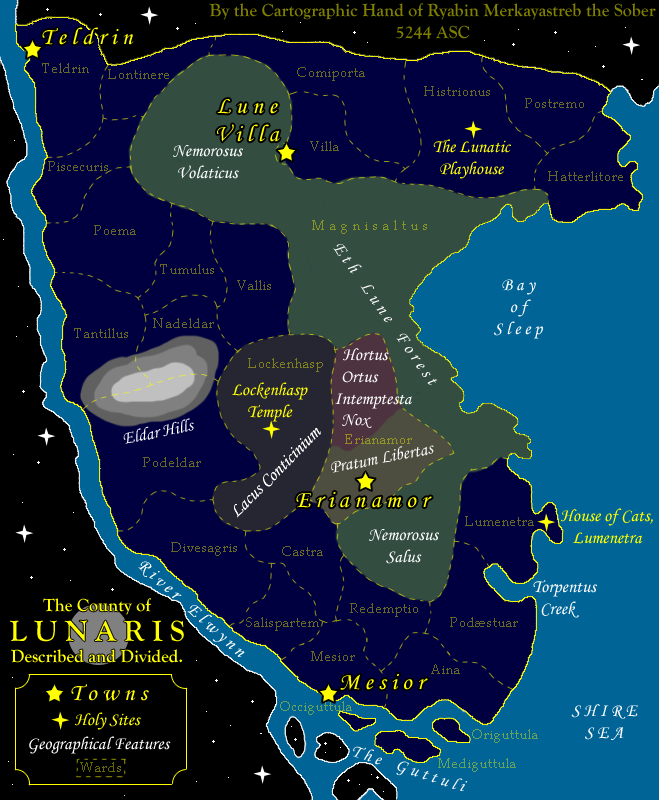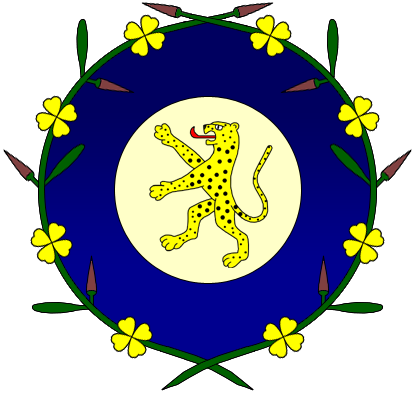Lunaris: Difference between revisions
No edit summary |
No edit summary |
||
| Line 6: | Line 6: | ||
largecity = Erianamor, Mesior, Teldrin | | largecity = Erianamor, Mesior, Teldrin | | ||
government = Feudal Countship | | government = Feudal Countship | | ||
leader = | leader = Yastreb | | ||
title = Count of Lunaris | | title = Count of Lunaris | | ||
language = English, [[Bastardized Latin]] | | language = English, [[Bastardized Latin]] | | ||
Revision as of 04:50, 23 April 2014

|
[[Image:{{{coat of arms}}}|100px]] |
| Feudal Status: | County |
| Capital: | Lune Villa |
| Largest Cities: | Erianamor, Mesior, Teldrin |
|
| |
| Local Leadership Title: | Count of Lunaris |
| Local Government: | Feudal Countship |
| Current leader: | Yastreb |
|
| |
| Local language: | English, Bastardized Latin |
| Local Religion: | Cedrism, Lunatic Mysticism |
The County of Lunaris is the oldest bottom-rung territory on Shireroth's Benacian mainland, and home to the Lunatic people.
Geography
Despite comprising the heart of the East Benacian coast, Lunaris has been given a comparatively isolated position by chance of geography. Except for its northern edge abutting old Goldshire, its borders are mostly comprised of water; the Elwynn River to the West, and the sea to the East. Since Shireroth's beginnings the area has been a place of muster for all those cast adrift, by whatever tribulation, from the great thoroughfares of Benacia. Here they have been largely left alone by events elsewhere, and have quietly made their lives.
Lunaris is a terrain of gentle proportions, no more severe than a series of rolling hills in the North which peter out entirely to flat land as one approaches the Elwynn Delta in the South. In climate it varies between hot and temperate; a light flurry of snow over its northern hills is an exremely rare and newsworthy occurrence. While not a premier holiday destination for its neighbours, Lunaris does attract the occasional vacationer in search of silence and solitude.
Originally an expanse of barren heath and wetland, the land has been developed over its history of human settlement into a patchwork of agricultural bocage and belts of forest. What pass for towns in Lunaris are merely villages that have grown sufficiently enough to merge together, yet are no denser at their middles than they are at their edges. The only exception to this is the port of Mesior on the shore of the River Elwynn Delta, which while not enormous is home to an industrial and port district more resembling those elsewhere on Micras.
TOWNS
Erianamor - the spiritual heart of Lunaris and the seat of its culture. Located on the aptly named Pratum Libertas, Erianamor was the last stronghold of the Lunatic people during the Arya occupation.
Lune Villa - the administrative capital of Lunaris, Lune Villa was founded as the seat of Upper Lunaris' countship during the Partition Era, on the edge of the Owl-infested Nemorosus Volaticus. Home to the Jabberwocky-esque element of Lunaris as the legacy of Count Hatter Elfson.
Mesior - previously Mejor, even more previously Smotretka. Founded by Krasniy Yastreb at the site of his first proper return to Lunaris in 2364. Renamed Mejor during the Arya occupation, it was developed significantly into a merchant and naval port.
Teldrin - a major transport hub of Lunaris, serving as an acclimatisation point for those entering or leaving the county. As the nearest point to Shirekeep, Teldrin has been utilised as an administrative node for Lunaris by various higher nobles in the past.
HOLY SITES
The House of Cats - Lunaris' most sacred site, this estate on the Lumenetra peninsula is the original home of Baroness Eriana, the founder of Lunaris. Essentially built as a giant art studio with modest living accomodation bolted on, the House of Cats is largely unused except as home to a large population of cats.
The Lunatic Playhouse - the site of the first artistic venture in Lunaris and the birthplace of its culture.
The Lockenhasp Temple of Mo'll and Quixy - built over a portal to Balgurd by the Piscatores of Brookshire, this temple keeps evil forces at bay in Lunaris. It has two principal gods: Mo'll, as a harvest blessing to improve crop conditions over the Lacus Conticinium; and Quixy, to assist in making the locals insane and thus innocent, to prevent their souls being stolen by Daemons.
GEOGRAPHICAL FEATURES
Eldar Hills - allegedly formed by the sacrificial death of Lunaris' founder, the rolling topography of northern Lunaris bubbles up into the Eldar hills before petering rapidly out to the flat lands of the south. The hills contain substantial natural gold deposits.
Eth Lune Forest - planted under the tenure of Count Hatter Elfson in the north, the forest unites the more ancient Nemerosii into one huge wooded belt stretching nearly the whole length of Lunaris. Along with Erianamor it was a refuge for those fleeing the Arya occupation.
Hortus Ortus Intemptesta Nox - established by Baroness Eriana Moon, this ancient horticultural region specialises in the growing of night-blooming flowers.
Lacus Conticinium - once a lake in ancient times and rumoured to contain a hidden evil within its depths. It dried up over the centuries, but efforts to exploit the old bed for crop growing were made difficult by the effect of the evil aura on soil fertility. The source of the problem was later determined by the Piscatores Alexandrii to be the presence of a portal to Balgurd at its heart, and the Lockenhasp Temple of Mo'll and Quixy was built over the portal to try and lessen its effects.
Nemorosus Salus - the Forest of Safety, the primary destination for all refugees in Lunaris. The forest has received those fleeing from everything from Dæmon Fish to Arya tyrants. Home to a migratory deer population who alternate between the forest and the Pratum Libertas to the northwest. Also the occasional leopard.
Nemorosus Volaticus - the Forest of Flight, once known for the presence of rare owl species but over-successful conservation efforts over the years have led to a massive overpopulation. It is advised not to enter this forest at night without ear protection.
Pratum Libertas - the Freedom Meadow, a melting pot and traditional stronghold of Lunatic culture. Its many active villages eventually fused into the Erianamor metropolitan area.
History
Lunaris was established as a Barony of the Duchy of Goldshire in 1520 ASC, by decree of Kaiseress Jadie I. Its first ruler was Baroness Eriana Moon, whose reign developed Lunaris from a swamp-ridden Goldshirian backwater into an artistic powerhouse. It was under her reign that creative materials were provided freely to ordinary people as a means of social improvement, rapidly earning the inhabitants of Lunaris a reputation for artistic eccentricity. This soon came to the attention of Eoin Dornan, whose suggestion that the people of Lunaris be named 'Lunatics' so flattered the Baroness that she decreed the name into official usage.
Much attention was lavished upon Lunaris in these early days, and people came from all Shireroth to marvel at its happenings - including one Krasniy Yastreb, the Defence Minister of the Soviet Republic of Arkania who was looking for a holiday destination. His brief visit and flirtatious interactions with the Baroness planted a charm for Lunaris within him, which in time would become significant.
A little later, as the War of the Wylthean Succession ravaged Shireroth, legend tells that Baroness Moon cast a protective shield over Lunaris so strong that it physically stopped any and all from entering the Barony. During this war Lunaris rebelled against Goldshire and sided with the Barony of Amity and Mirioth, who were similarly rebelling against Goldshire's allies Yardistan. Baroness Moon also struck up a more-than-friendly relationship with Baron Greg Russell of Amity & Mirioth, which was soon cast into danger by the latter being subject to a case of severe poisoning. As her lover lay dying, Baroness Moon consulted the myriad creatures of Lunaris who told her that he could only be saved by her sacrifice. Legend tells that she made a vial of potion, consisting of a single dragon's tear mixed with her very own blood - blood which she produced with a self-inflicted dagger to the heart. An owl carried the potion aloft to Mirioth, where its use as a cure was successful. Baroness Moon's fading body was taken away by the weeping dragon to a place unknown. The site of her sacrifice is said to have risen above its surroundings to form Lunaris' Eldar Hills.
For many years afterwards the Lunatics made their lives without a clear ruler, until without a voice they were subject to a great upheaval: as part of the New Feudalism of Kaiser Yarad I in 2285 ASC, Lunaris was deemed too large to be a single County, as the new territories of that reform were called. By the stroke of a quill it was split into two Counties: Upper Lunaris and Lower Lunaris. This arrangement would stand for precisely 1001 ASC years.
Fortunately the two Lunarises were taken into capable hands; Hatter Elfson was installed as Count of Upper Lunaris in 2346, followed by Krasniy Yastreb as Count of Lower Lunaris in 2364. As if in recognition of this resurgence, the spirit of Eriana Moon herself returned to Lunaris. For a long time Krasniy and Hatter ruled Lunaris between them, with Eriana as the spiritual force of the land. While the three desired the reunification of the Counties of Lunaris more than anything, the Higher Nobles responsible were unwilling to allow it.
In time Hatter and the spirit of Eriana faded from Lunaris, leaving Krasniy to watch over the land alone. A promotion to higher nobility, combined with the cooling of opposition at last allowed Krasniy to sieze his oppurtunity and re-unite Lunaris in the year 3286 ASC. It was this event which provoked the final appearance of Eriana Moon, who offered quiet but heartfelt congratulation on Krasniy's achievement before slipping into the darkness once more.
Waves of inactivity touch all at some point, and so in the end it touched Krasniy. His presence faded from Lunaris and left it once more without leadership. This set the stage for the darkest hour in all Lunatic history, when in 3737 ASC a foreign ruler known as Aryeztur Mejorkhor came to Shirerithian shores fleeing the disintegration of Antica, bringing countless thousands of refugee colonists. His landfall was made on the southern coast of Lunaris, and from there he established a reign which would in time spread across all of Goldshire. As the Arya, as the colonists were known, took over the land with their alien culture, the Lunatics were driven back to the town of Erianamor and its surrounding forests, where they were declared prisoners in human game preserve for the amusement of their conquerors. Lunaris was even renamed Parvatvana in honour of its new overlords. It was only at the protests of the kindred spirits across Shireroth that the Lunatics were spared complete annihilation at that moment.
It was to the Lunatics' fortune that the Arya settlers continued in their itinerance and largely moved on from Lunaris, although a significant population remained as a ruling elite over the Lunatics. This final cancer was cut out of Lunaris by the Settlement of Anandja of 3961 ASC, in which Kaiseress Anandja II gave Imperial recognition to Lunatics' right over their homeland, restored their name and disenfranchised the Arya from their stolen gains with the exception of the port city of Mejor, wherein they were confined as a curiosity in retribution for acting as such against the Lunatics.
There followed a long period of quiet peace once more, as Lunaris healed from the gaping wound inflicted by its invasion. During this time, as throughout all of its history, the territories to whom it was subject within Shireroth appeared, disappeared, changed and transformed. Lunaris itself was untouched, however, and remained so until the unexpected return of Krasniy Yastreb to Shireroth in 4963 ASC. Returned to the throne of Lunaris by Kaiseress Mira Raynora Minor, and reeling in shock from discovering the events which had occurred in his long absence, Krasniy resolved to bring the customs and traditions of the Lunatics to wider attention in order to safeguard them from future cultural genocide. He achieved this by a great chronicling of the Lunatic people (for which he was given the Silver Swan Award by Kaiseress Mira) as well as writing the plays Rusalkoholic and Kapusta Kaput (the latter of which won him a posthumous FNORD).
After Krasniy's untimely demise at the hands of the Assayers, his illegitimate son Ryabin Merkayastreb became Count of Lunaris in 5222 ASC - also the year in which the Arya mother state of Aryasht gained entry to Shireroth, precipitating the mass migration of the Arya population Southern Lunaris back to their ancestral homeland.
Culture
The people of Lunaris are, aside from being artistically inclined, intensely spiritual in their everyday lives. Superstition rules their world - to the Lunatic anything and everything is a sign, to be interpreted and pondered. While philosophically wholesome, this casual mysticism does make Lunatics difficult to work with at times, especially in the more logical fields like science and engineering. While Cedrism is widely practiced in Lunaris, it is only a layer upon the popular mysticism - to the Lunatic the Gods do not have all the answers; they merely have enough of them to have become Gods.
There are three official languages in Lunaris: English, Latin and Lunatic Latin. English is predominant, and used everywhere in private and public. Latin is also used throughout Lunaris for official purposes. Lunatic Latin is a heavily abbreviated and colloqialised dialect of the above: it is spoken widely in private among the people of Erianamor and the surrounding area. In addition a little ancient Shirerithian (Praeta) is spoken during Cedrist temple services throughout the County, and among the monastic communities of the Lacus Conticinium.
The Lunatic accent has been likened to the voice of a cat; rumbling voiced consonants, screeching vowels and a jarring range of tone sounding from a distance like a flutter of meows and purrs. Inhabitants of the more remote Lunatic villages have been known to dispense with language entirely and communicate by cat sounds alone.
Lunatics of good standing with each other will, when parting, offer each other the blessing 'Heavens Light Your Night'. Usually shortened to 'Heavens Light', this is thought to be a Lunatic derivation of the ancient Treesian "Sun Bless, Earth Keep" introduced by Eriana Moon (who was a half-blood Treesian herself). You may hear it spoken as the cheerful "Cælos 'Luminabit!" around Erianamor. However, the more fanatical Cedrists among the population tend to avoid this greeting as it is considered unacceptably Soloralist in origin. For them a simple "Death Spare" or similar blessing tends to suffice.
The nocturnal nature of Lunatics is also of interest. The nights are still quieter than the days, but not noticeably. This is largely the result of the short working hours inherent in Lunaris' creative and agrarian economy, which to outside economic minds would be considered 'undeveloped'. To the Lunatic however, the economic element is subordinate to the social in all areas of life. In addition each full moon is considered a public holiday, and during this time it is generally frowned upon to engage in non-leisure activity or to be asleep during the night.
Government
Lunaris is ruled by the Count, exercising his power directly but lightly with the assistance of twenty-eight County Wardens. Traditionally the towns and villages of Lunaris are allowed a high degree of autonomy, as the social and cultural arrangements for each town are unique and require local administration.
Traditionally the playhouses (of which every town and village has at least one) tend to be centres of municipal government, as they are usually the most ornate building in their area and hold the staff and facilities to perform civic functions in addition to their stage performances.
The only entities under exclusive County control are the County bureaucracy itself, the town of Lune Villa, the Holy Sites and the County Militia. But while the autonomous elements of the County are allowed great freedom over their own affairs, the arrangement is not to be confused with a democracy. Freedom is granted on the understanding that it is used wisely, and the County reserves the right to come down hard on any and all who abuse this freedom to the detriment of the County. This power is frequently exercised - the tradition of occasional furious temper began with Baroness Eriana and has been integral to the doctrine of Lunatic Government ever since.
In the field of outside relations, Lunaris is largely insular and uninvolved with the minutiae of affairs outside its borders. But on matters of great Shirerithian national importance, Lunaris will speak and speak clearly - usually with an eye to the bigger picture. While intensely loyal to the sitting Kaiser, Lunaris is less attached to its sub-Imperial superiors; a result of being constantly swapped between subdivisions over its history. It is perhaps these interruptions to the meddlings of higher nobles that have allowed its culture to survive intact and distinct within Shireroth.

